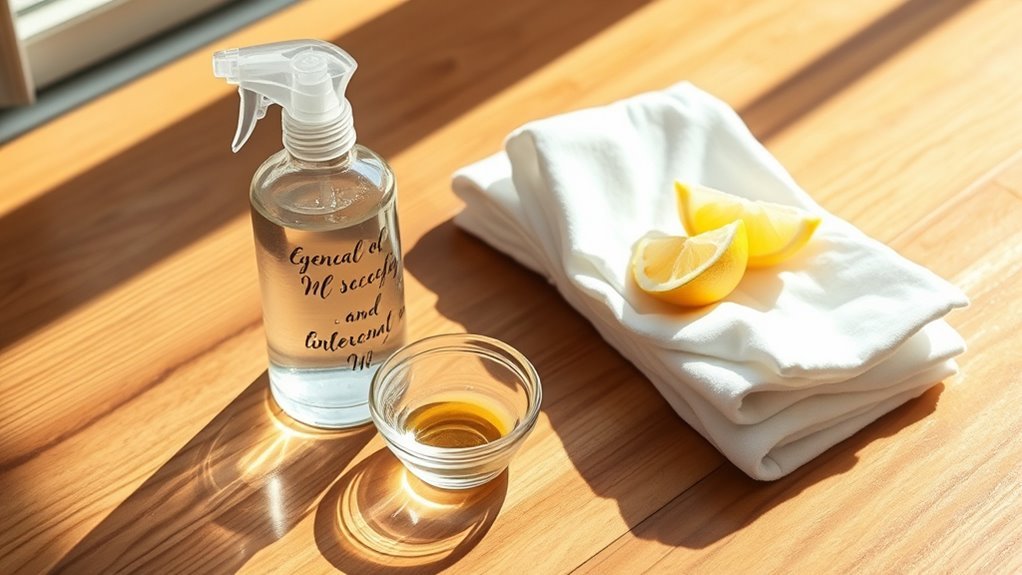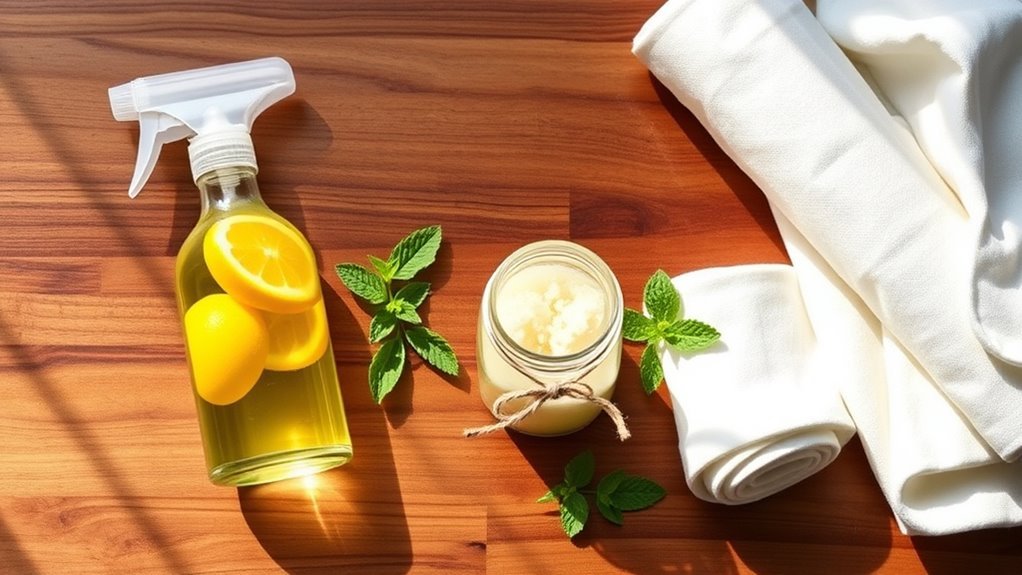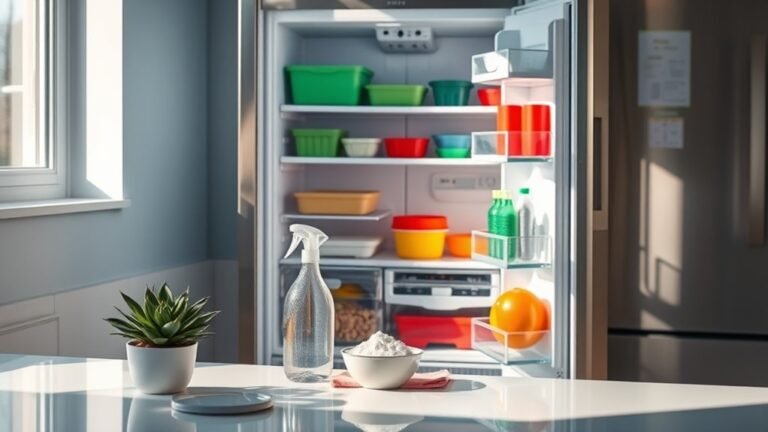Budget-Friendly DIY Cleaning Products for Desk
You can clean your desk affordably with simple DIY products using vinegar, baking soda, and essential oils. Mix distilled water with white vinegar and a few drops of essential oils for an all-purpose spray that tackles dust and fingerprints. For disinfecting, combine vinegar with rubbing alcohol and soak paper towels for quick wipes. Homemade glass cleaner uses vinegar and water for streak-free surfaces. Use these easy recipes and tips for a fresh, organized workspace. Keep going to discover more helpful cleaning ideas.
Essential Ingredients for DIY Desk Cleaners

Although you can find many commercial cleaners, making your own desk cleaner lets you control the ingredients and avoid harsh chemicals. When creating your DIY solution, focus on essential oils and eco friendly options to keep it natural and safe. Essential oils like tea tree, lavender, and lemon not only add a pleasant scent but also have antibacterial properties. Choose white vinegar or baking soda as your base—they’re powerful yet gentle cleaners that won’t damage your desk surface. Water acts as a perfect diluent, balancing strength and usability. By selecting these simple, natural ingredients, you’re embracing freedom from synthetic chemicals and reducing your environmental impact. Your desk will stay spotless, fresh, and healthy without compromising your values or the planet.
How to Make an All-Purpose Desk Spray
When you want a quick and effective way to keep your desk clean, making an all-purpose spray is a great solution. You’ll enjoy the freedom of customizing your cleaner with eco friendly alternatives and natural fragrance options that suit your style. Here’s how to whip it up:
Create a personalized, eco-friendly all-purpose spray for a fresh, clean desk in minutes.
- Mix 1 cup of distilled water with 1/4 cup of white vinegar for a gentle, effective base.
- Add 10-15 drops of essential oils like lavender or lemon for a invigorating scent.
- Pour the mixture into a spray bottle for easy use.
- Shake well before each use to blend the ingredients.
This DIY spray tackles dust, fingerprints, and spills without harsh chemicals, keeping your workspace fresh and safe.
DIY Natural Disinfectant Wipes

You can make your own natural disinfectant wipes using simple ingredients like vinegar, rubbing alcohol, and essential oils for extra germ-fighting power. I’ll walk you through the step-by-step preparation to guarantee they’re both effective and safe for your desk surfaces. These wipes are a quick, eco-friendly way to keep your workspace clean without harsh chemicals.
Ingredients for Effectiveness
Since you want your DIY natural disinfectant wipes to be truly effective, choosing the right ingredients is essential. You’re aiming for natural alternatives that don’t sacrifice cleaning effectiveness, giving you freedom from harsh chemicals while keeping your desk spotless. Here’s what you’ll want to include:
- White vinegar: A powerful natural disinfectant that cuts through grime.
- Rubbing alcohol (70%): Boosts germ-killing power without toxic residues.
- Essential oils (like tea tree or lavender): Add antibacterial properties and a pleasant scent.
- Distilled water: Dilutes the mixture, ensuring it’s safe for surfaces and skin.
Step-by-Step Preparation
Preparing your DIY natural disinfectant wipes involves just a few simple steps that anyone can follow. First, gather eco friendly alternatives like distilled water, white vinegar, and a few drops of essential oils for a fresh scent. Cut a roll of paper towels in half to fit your container. Mix one cup of distilled water with half a cup of vinegar and 10-15 drops of essential oils in a bowl. Pour the mixture over the paper towels in an airtight container, allowing them to soak evenly. Seal the container to keep the wipes moist. These wipes offer cleaning safety without harsh chemicals, giving you freedom from toxins while keeping your desk spotless. Now, you’re ready to clean with a safer, budget-friendly solution!
Homemade Glass Cleaner for Desk Surfaces
Although commercial glass cleaners are widely available, making your own homemade glass cleaner for desk surfaces is a simple and cost-effective way to keep your workspace sparkling. You’ll enjoy freedom from harsh chemicals by embracing eco friendly alternatives that are safe and effective. Here’s a quick recipe and some glass cleaning techniques to try:
Create a sparkling desk with a simple, eco-friendly homemade glass cleaner free from harsh chemicals.
- Mix equal parts white vinegar and water in a spray bottle
- Add a few drops of your favorite essential oil for a fresh scent
- Spray lightly on glass surfaces and wipe with a microfiber cloth
- Buff edges gently to avoid streaks and achieve crystal-clear shine
This DIY cleaner not only saves money but also lets you control what touches your desk, promoting a cleaner, greener workspace without sacrificing quality.
Creating a Gentle Wood Polish for Wooden Desks

When you want to maintain the natural beauty of your wooden desk without exposing it to harsh chemicals, creating a gentle wood polish is the way to go. You can easily whip up a polish using natural ingredients like olive oil and lemon juice. This combo not only nourishes the wood but also highlights its grain and protects it from drying out. The wood polish benefits include restoring shine and adding a subtle protective layer, helping your desk stay vibrant longer. Just mix two parts olive oil with one part lemon juice, apply a small amount with a soft cloth, and buff gently. This simple, budget-friendly solution gives you freedom from synthetic products while keeping your wooden desk looking fresh and cared for every day.
Using Vinegar Solutions for Stubborn Stains
If you’ve ever dealt with stubborn stains on your desk, you know how frustrating they can be to remove. Luckily, vinegar solutions offer a powerful, budget-friendly way to tackle these marks without harsh chemicals. Here’s how you can harness vinegar’s natural cleaning power:
Stubborn desk stains? Vinegar solutions provide an easy, affordable, and natural way to clean without harsh chemicals.
- Mix equal parts white vinegar and water in a spray bottle.
- Spray the solution directly on the stubborn stains and let it sit for 5–10 minutes.
- Gently scrub with a soft cloth or sponge to lift the grime.
- Wipe clean with a damp cloth and dry thoroughly.
This method works well on many surfaces, freeing you from stubborn stains without damaging your desk. By choosing vinegar solutions, you get an easy, eco-friendly approach to keeping your workspace fresh and inviting.
Tips for Maintaining a Clean and Organized Desk
Keeping your desk clean and organized takes a little daily effort, but it makes a big difference in your productivity and mood. To embrace freedom from clutter, start with simple desk organization strategies. Use trays or small containers to keep essentials within reach but neatly contained. Set a timer for five minutes at the end of each day to declutter your workspace—these decluttering tips will help you maintain focus and prevent buildup. Avoid piling papers; instead, file or recycle them regularly. Keep only what you truly need on your desk to create a space that invites creativity and calm. By committing to these habits, you’ll enjoy a clean, organized desk that supports your workflow without feeling like a chore.
Safe Storage and Usage of DIY Cleaning Products
A tidy desk sets the stage for effective cleaning, but knowing how to store and use your DIY cleaning products safely guarantees you protect both your workspace and yourself. To keep things hassle-free and secure, follow these simple tips:
- Use airtight storage containers to prevent spills and maintain product effectiveness.
- Clearly label each container with the product name and ingredients to avoid confusion.
- Store your DIY cleaners out of reach from kids or pets, ideally in a cool, dry place.
- Always test a small area of your desk before full application to avoid damage.
Frequently Asked Questions
Can DIY Cleaners Damage Electronic Devices on My Desk?
Can cleaners be friends or foes? When it comes to your electronics, cleaner safety is key. You don’t want harsh chemicals seeping into your devices, causing damage or corrosion. With proper electronic care, you’ll choose gentle, alcohol-free solutions and use soft cloths, avoiding sprays directly on screens or keyboards. Taking these simple steps lets you protect your gear while keeping your space fresh, giving you the freedom to work worry-free.
How Long Do Homemade Cleaning Products Last Before Expiring?
Homemade cleaning products usually have a shelf life of about one to two weeks, depending on ingredients. Since they lack preservatives, they can spoil or lose effectiveness quickly. To extend their life, store them in airtight containers away from direct sunlight and heat. You’ll want to label your mixtures with the date you made them, so you know when it’s time to mix up a fresh batch. Trust your senses—if it smells off or changes color, toss it.
Are These DIY Cleaning Products Safe for Pets in the Home?
You’ll want to prioritize pet safety when using any cleaning products around your home. Many DIY cleaning ingredients like vinegar and baking soda are generally safe, but some, like essential oils, can be harmful to pets. Always research each ingredient and keep your pets away from freshly cleaned surfaces until everything dries. By choosing pet-friendly ingredients, you can keep your space clean without compromising your furry friend’s health or your freedom to live worry-free.
Can I Add Essential Oils for Fragrance Without Reducing Effectiveness?
Imagine your cleaning spray as a blank canvas, ready for a splash of personality. You can absolutely add essential oils for fragrance without diluting its power. Essential oil benefits go beyond scent—they can uplift your space while keeping things fresh. Just pick fragrance options that blend well, like lemon or lavender, and don’t overdo it. That way, you keep your cleaning effective and enjoy a freedom-filled, aromatic vibe.
What Are Alternatives to Vinegar for Those Sensitive to Its Smell?
If you’re sensitive to vinegar’s smell, you’ve got great citrus alternatives like lemon or orange juice—they freshen up your space without overpowering it. Baking soda’s another fantastic option; it’s gentle, natural, and helps tackle odors and grime effectively. You don’t have to settle for harsh scents or chemicals. Using these alternatives lets you clean freely, enjoying a fresh, inviting environment without compromising on your comfort or style.






